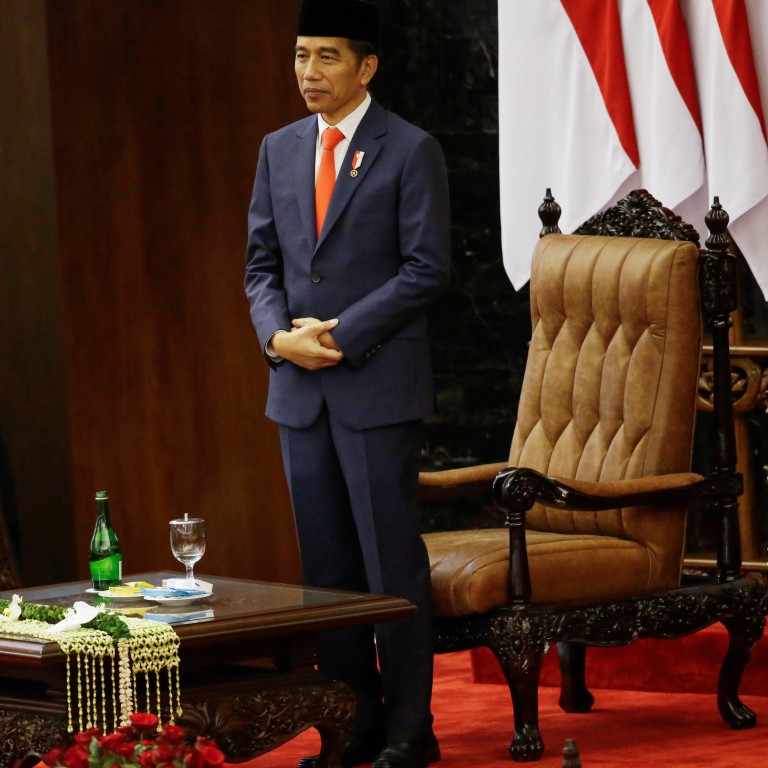
Indonesia’s Joko Widodo pledges to create jobs and cut bureaucracy as he’s sworn in for 2nd term
- Jokowi’s inauguration was attended by several foreign dignitaries including Chinese Vice-President Wang Qishan and Singapore PM Lee Hsien Loong
- He vowed to develop the country’s human resources, overhaul the inefficient bureaucracy and move out of the middle-income trap by 2045
“In the name of Allah, I swear to fulfil my duties as the president of the Republic of Indonesia to the best of my abilities and as just as possible,” Widodo, 58, said as he took the oath with a copy of the Koran held above his head during the brief ceremony before the 711-member People’s Consultative Assembly, the upper house.
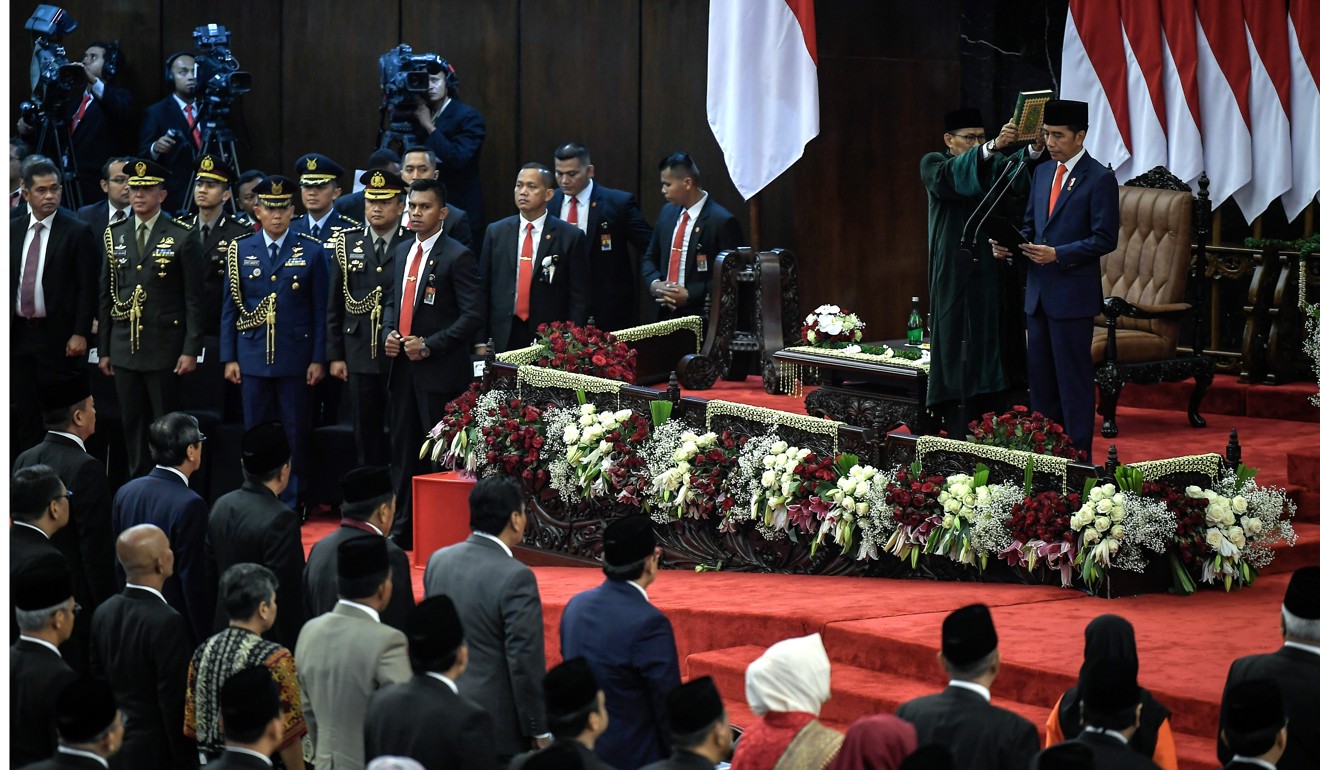
Widodo, commonly known as Jokowi, pledged to develop the country’s human resources, move Indonesia out of the middle-class trap to be one of the world’s top five economies by 2045, overhaul an inefficient, corruption-riddled bureaucracy, and reform outdated laws which are a hindrance to development.
“However, none of that will come automatically, and will not come easily,” he said in his speech.
The long-awaited cabinet announcement would be made on Monday, he also stated.
Jokowi’s plan to reform the bureaucracy includes trimming the number of civil servants. “The downsizing of the bureaucracy must continue on a large scale. Investments in job creation must be prioritised,” he said.
Between 2015-2018, around 6,000 regulations were introduced to the Indonesian economy.
“To ministers, officials and bureaucrats, be serious in ensuring that our goals of development are reached. For those who are not serious, I will not show mercy. For sure, I will sack you,” said Jokowi.
CSIS researcher Arya Fernandes said the bureaucracy will determine the success of the government’s policies. “It is important to strengthen the internal mechanism to control the performance [of the bureaucracy] in a transparent manner,” he said.
“I believe that in order for the bureaucracy to be reformed, the minister charged with reforming should be filled by a professional and not a member of a political party,” he argued.
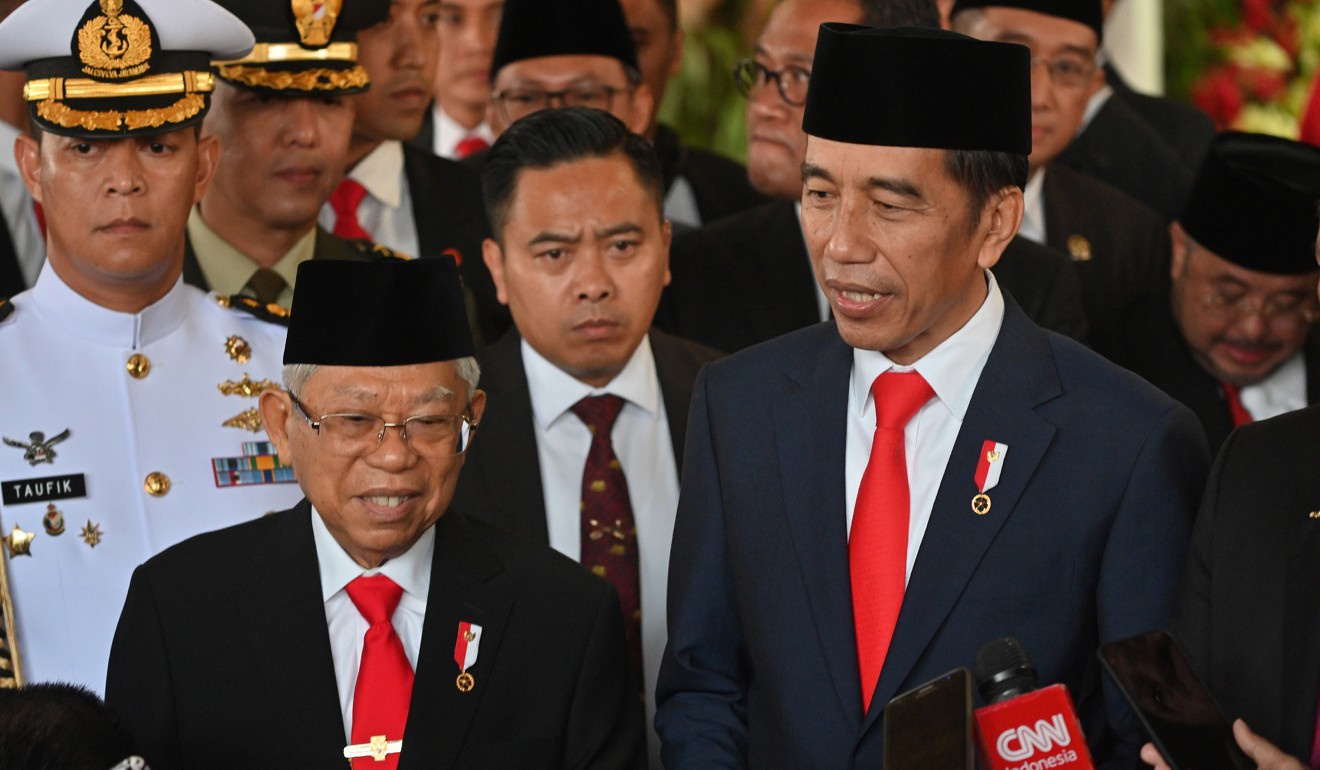
Widodo said in his speech that “all forms of regulatory obstacles must be moderated, must be cut, must be eliminated”.
Yose Rizal Damuri, chief economist at Indonesia’s Centre for Strategic and International Studies (CSIS), said there was a need to reform outdated and problematic regulations, and also to reform the mechanisms and processes that produce new laws.
Indonesia rounds up 36 terror suspects ahead of Jokowi inauguration
“Between 2015-2018, around 6,000 regulations were introduced to the Indonesian economy – and we are only talking about central government, not the local governments,” he said.
Ministries typically issue the regulations without any consultation with the public or relevant stakeholders. The regulations could also be withdrawn after a week.
“What you have is basically a very complicated regulatory framework, overlapping with each other, and also contradictory among different ministries,” said Yose. These laws have hampered both local and foreign investments in the country, he said.
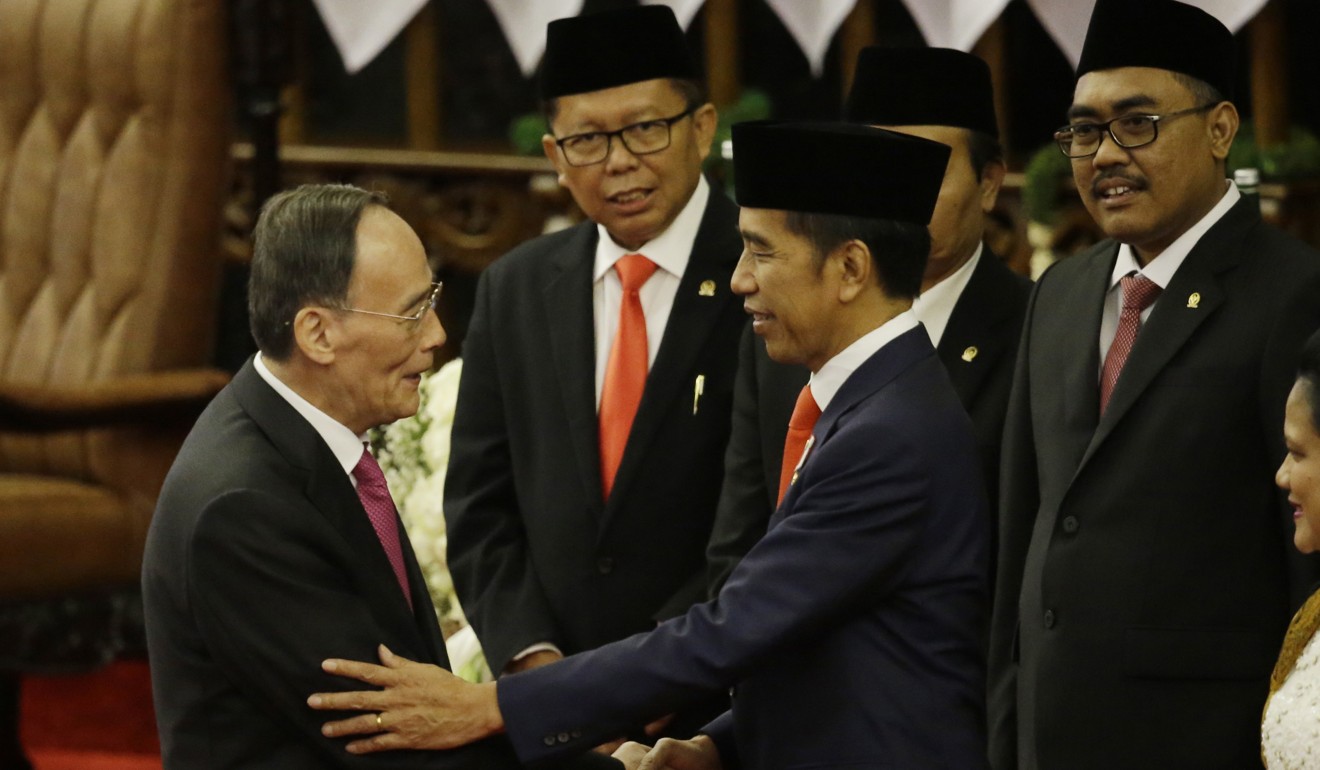
Jokowi’s ambition of moving out of the middle-income trap by 2045 with a GDP output of some US$7 trillion will be challenging, said Yose.
“In order to achieve that, the economy needs to grow 7.3 per cent, in nominal US dollar terms, every year until 2045. That is a little difficult, very challenging but I guess not impossible,” he said.
Widodo pledged to further improve the investment climate by relaxing strict labour rules, opening up more areas to foreign investors and speeding up trade agreements.
Jokowi also said the government will invite parliament to create two new laws – on creating jobs and empowering small-and-medium sized enterprises.
For the next five years, priority will be placed on developing the country’s human resources into a force “skilled in science and technology” as well as inviting “global talents to work with us”.
“The development of human resources will be our main priority. We want to build our human resources into a pool of hard-working workers who are dynamic,” said Jokowi.
In a country where about half the population is under 30, students consistently rank near the bottom of international student surveys.
The president has allocated money for skills training for the unemployed and expanded a programme to pay for higher education for the poor.
Government officials also say a ban on foreign ownership in the university sector will be lifted, but primary education, particularly in remote areas, remains under-resourced.

Jokowi thanked his guests for attending the ceremony and called his losing presidential challenger, Prabowo Subianto, “my good friend”.
Prabowo and Great Indonesia Movement Party (Gerindra) are widely expected to join Jokowi’s coalition, even though he has not publicly announced a decision.
Jokowi mulls whether to sideline opponents or build a broad coalition
“I can accept it if Prabowo joins our coalition as we need to have a national reconciliation after the [bruising] election campaign,” said MP Ahmad Vananzda of the Indonesian Democratic Party-Struggle (PDIP) – Jokowi’s party. “It will then makes us a strong and stable government.”
The president’s parliamentary alliance, led by his Indonesian Democratic Party of Struggle (PDIP), controls 349 seats in the 575-seat legislature, or 60.69 per cent.
Prabowo’s Gerindra garnered 12.57 per cent of the parliamentary vote to win 78 seats and now accounts for the third largest bloc in the legislature.
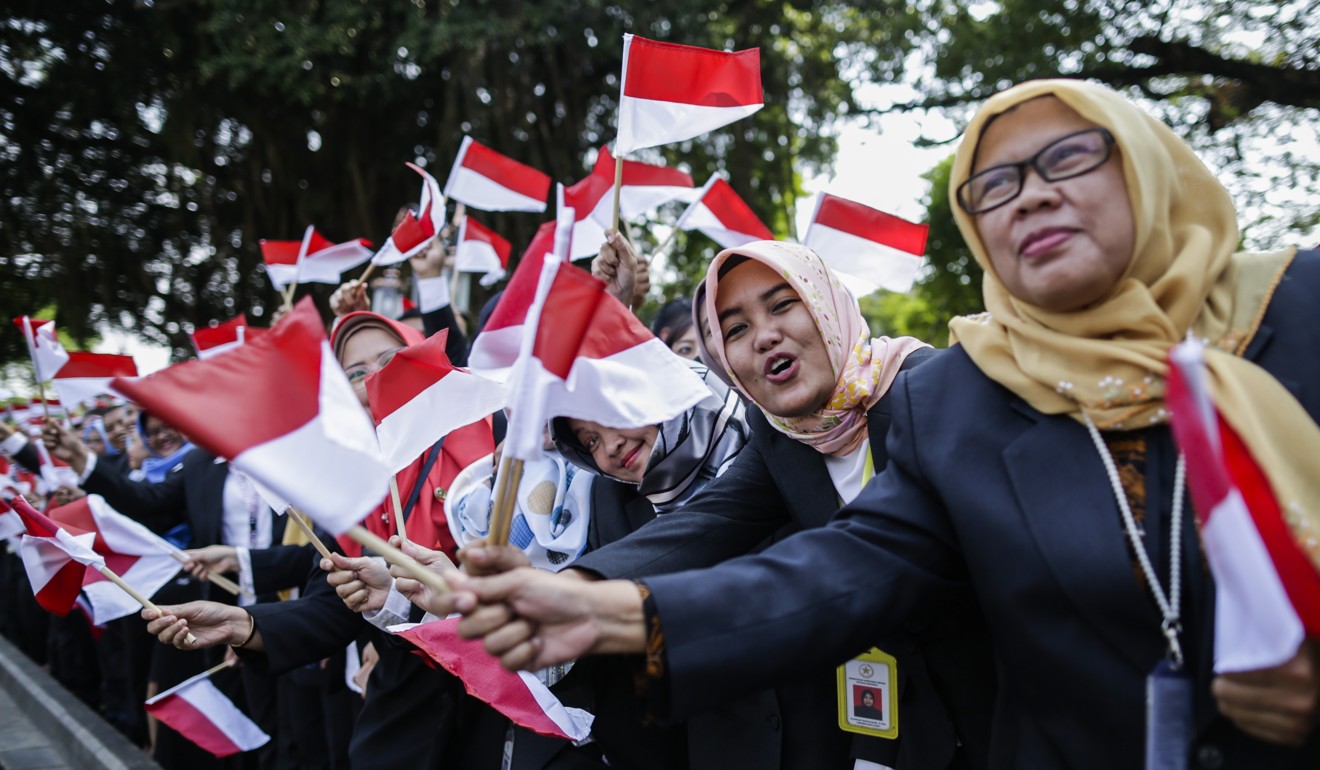
Arya of the CSIS believes Jokowi’s second term will be much more challenging as he will be handling a much larger coalition.
“The potential for internal disharmony within the coalition is there,” he said.
The public’s dissatisfaction over several political decisions that was seen as not being pro-people, will also weigh on Jokowi, Arya said. These include proposed new laws that would reduce the independence and capabilities of the national Corruption Eradication Commission, and would affect rights and free speech by criminalising sex outside marriage and “insulting” the president.

